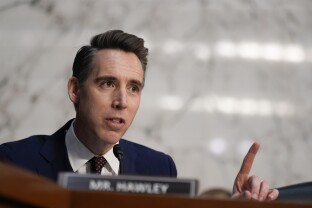Sen. Josh Hawley said Wednesday that he will “very soon” unveil a bill that aims to add up to a year of prison time for criminal offenders who burn the U.S. flag.
He confirmed to NOTUS that he’s working on the bill with the support of President Donald Trump, who on Tuesday mentioned the flag-burning legislation.
“It would be that if you burn the flag in furtherance of a crime, you would get — it would be up to a one-year enhancement to your sentence,” Hawley said in a brief hallway interview.
The push comes as demonstrators against Immigration and Customs Enforcement raids in Los Angeles stretch into their fifth day, with more protests planned across the United States.
In Los Angeles, demonstrators clashed directly with law enforcement, with some destroying private property. Video footage published by Fox News, which could not be independently verified by NOTUS, appears to show protestors torching the American flag as part of demonstrations.
Trump and his administration have come out forcefully against the demonstrators, calling them “paid insurrectionists” and for stricter penalties for flag-burning.
“Did you see a lot of flags being burned? They weren’t being burned by people from our country or from people that love our country,” Trump said during remarks at Fort Bragg on Tuesday. “People that burn the American flag should go to jail for one year. That’s what they should be doing, one year, and we’ll see if we can get that done. We’re going to try and get that done. We’re working with some of your senators. I know Senator Josh Hawley is very much involved.”
The 1989 Supreme Court case Texas v. Johnson found that flag burning is a protected form of expression. Hawley, who previously served as attorney general of Missouri, said that’s negated when you’re committing a crime.
“If you’re committing a crime and you burn the flag as part of that, you ought to get some additional time in jail,” he said. “That’s not protected.”
Thomas Berry, director of the Cato Institute’s Robert A. Levy Center for Constitutional Studies, said what’s being proposed by Hawley and Trump runs afoul of the First Amendment, referencing a 1992 SCOTUS case R.A.V. v. City of St. Paul.
“Even if conduct can be criminalized, it’s unconstitutional to add to the penalty because of disapproval with the particular message sent by the conduct,” he told NOTUS in an email, adding later: “So even though it’s permissible to have a law criminalizing violent protests, the government can’t impose a greater penalty on violent protests expressing an anti-American viewpoint than on violent protests expressing a pro-American viewpoint.”
—
Violet Jira is a NOTUS reporter and an Allbritton Journalism Institute fellow.
Sign in
Log into your free account with your email. Don’t have one?
Check your email for a one-time code.
We sent a 4-digit code to . Enter the pin to confirm your account.
New code will be available in 1:00
Let’s try this again.
We encountered an error with the passcode sent to . Please reenter your email.


